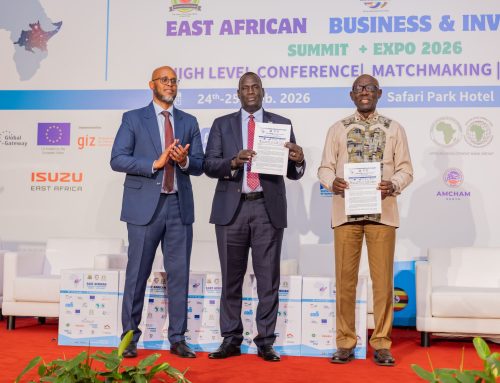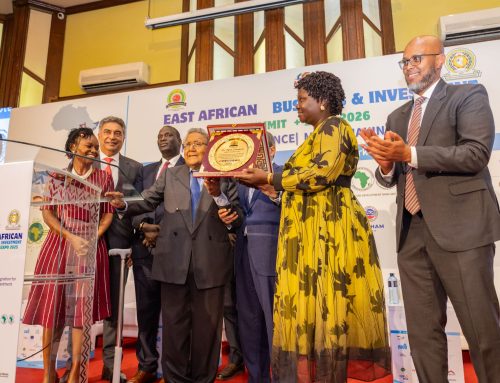Summary of the assignment:
| Nature of assignment | Short term |
| Location | Within EAC |
| Timeframe | 30 working days |
| Reporting | To Executive Director/CEO |
| Application Deadline | 20th June 2022 |
BACKGROUND TO THE EABC TRADEMARK EAST AFRICA PROJECT
The East African Business Council (EABC) is the umbrella body of the Private Sector in the East African Community (EAC). It brings together national private sector umbrella bodies, manufacturers, employers, bankers, insurance and transporters associations, chambers of commerce, corporates, and medium and small enterprises from the entire East African region.
EABC’s mandate is to represent and promote the interests of the EAC business community, provide value-added services that enhance trade and competitiveness, and participate actively and positively in influencing legal and regulatory formulation to improve the business environment. EABC works with the major stakeholders such as the EAC Secretariat, Organs, Institutions and National Governments and provides input in policy discussion while advocating for the implementation of resolutions at the national level aimed at increasing intra-regional trade. For effective implementation of the Regional PPD programme, EABC was selected by TMEA as the lead implementing partner for the Private Sector Organizations.
TradeMark East Africa (TMEA) is a multi-donor funded, not-for-profit organisation, established in 2010 to promote regional trade and prosperity in East Africa. TMEA combines a regional approach with national-level interventions and works closely with East Africa institutions (e.g., East African Community EAC Secretariat, Corridors Authorities), national governments, and private sector and civil society organisations. TMEA has its headquarters in Nairobi – Kenya with branches in Burundi, Rwanda, South Sudan, Tanzania, Uganda, and The Democratic Republic of Congo (DRC). TMEA has recently revised its strategic focus in line with national, regional, and global priorities as defined in its new corporate strategy (2017 – 2023). The revised Theory of Change (TOC) is anchored on two strategic objectives: (i) Reduced Barriers to Trade; and (ii) Improved Business Competitiveness. Under the improved business competitiveness strategic objective is TMEA’s Public-Private Dialogue (PPD) for trade and investment programme.
The East African Business Council (EABC) is implementing the TMEA project titled Public‐Private Sector Dialogue (PPD) for Trade and Investment in Eastern Africa. This is a regional project targets to mainstream advocacy throughout TMEA’s project clusters which are transport & logistics; customs & tax; standards & Sanitary Phyto Sanitary (SPS) Measures; African Free Trade Area (AfCFTA) & Tripartite Free Trade Area (TFTA) and Non-Tariff Barriers (NTBs). The programme’s core objective is to enhance Private Sector Organisations (PSOs) capacity to influence decision‐making proactively and positively, to accelerate dispute resolution, to sustain political buy‐in, to increase commitment and to reduce overall programme risks in TMEA’s project clusters. This will increase trade and investment in the EAC. The Regional Programme will contribute to core TMEA corporate results outlined below:
- Reduce transport (road, rail, and air) cost and time along transport corridors by 10% and increase efficiency in private sector logistics services provision
- Enhance Customs and other trade‐related agencies efficiency (25% reduction in time to process trade documentation) through integrated trade management systems and greater inter‐agency collaboration.
- Reduced tariffs, taxes, and levies by 5‐8% overall (including sub‐national) reduce exemption regimes, CET, and increase import/export tax incentives
- Enhanced efficiency of Bureaux of Standards, reduce related costs and time by 10%, reduce counterfeit and sub-standard goods by 20% through enhanced inter‐agency collaboration and improve private sector compliance.
- Resolve 30% of all reported NTBs along TMEA project clusters within a year.
- Catalyzing a 10% increase in exports annually, 93,000 direct jobs and $425m additional investment after seven years in targeted sectors in the EAC under the Compact and TLCs through increased investment incentives.
- RATIONALE AND OBJECTIVE OF THE ASSIGNMENT
One of the EABC-TMEA project outcomes is to improve the adoption and harmonization of customs and domestic tax-related policies and principles among the Partner States with a view of reducing tariffs, taxes, levies, exemption regimes and increasing import/export tax incentives. In line with this outcome, it noted that through the Treaty for the Establishment of the East African Community the Partner States undertook to harmonize their tax policies with a view to removing tax distortions in order to bring about a more efficient allocation of resources within the Community. Subsequently, harmonisation of the taxes and non-application of discriminative taxes are emphasized in the three stages of the EAC integration which are Customs Union, Common Market and Monetary Union.
With a non-discriminatory tax regime there is a commitment that in the course of the establishment of the Customs Union, the EAC Partner States shall among other things eliminate internal tariffs and other charges of equivalent effect. The EAC Treaty through Article 75(4) commits the Partner States not to impose any new duties and taxes or increase existing ones in respect of products traded within the Community. Additionally, under Article 75(6) of the EAC Treaty, the EAC Partner States committed to refrain from enacting legislation or applying administrative measures that directly or indirectly discriminate against the same or like products of other Partner States. Article 15 on National Treatment of the Protocol on the Establishment of the East African Community Customs Union bar EAC Partner States from using discriminately administrative measures or internal taxes on imported products from the EAC Partner States against similar domestic products. Article 15(1) of the Protocol states that the Partner States shall not (a) enact legislation or apply administrative measures which directly or indirectly discriminate against the same or like products of the Partner; or (b) impose on each other’s products any internal taxation of such a nature as to afford indirect protection to other products. Furthermore, the Protocol through article 15(2) reinforces non-discrimination on internal tax by stating that “No Partner States shall impose, directly or indirectly, on the products of the other Partner States any internal taxation of any kind in excess of that imposed, directly or indirectly, on similar domestic products. Article 15(3) on National Treatment of the Protocol ends by stating that Where products are exported to the territory of any Partner State, any repayment of internal taxation shall not exceed the internal taxation imposed on them, whether directly or indirectly.
With regards to the harmonisation of excise duties/taxes as part of domestic taxes legal justification is mainly derived from Article 83(2)(e) of the Treaty for Establishment of East African Community. The Artcle obliges the Partner States to “harmonize their tax policies with a view to removing tax distortions in order to bring about a more efficient allocation of resources within the Community.”The Article is reinforced by Article 32 on the harmonisation of tax policies and laws of the Common Market Protocol that states “the Partner States undertake to progressively harmonize their tax policies and laws on domestic taxes with a view to removing tax distortions in order to facilitate the free movement of goods, services, and capital, and the promotion of investments within the Community”. In addition, Article 8 of the East African Monetary Union Protocol provides for harmonisation and coordination of fiscal policies and avoidance of harmful tax competition. Tax neutrality is very critical for the good functioning of both the Customs Union and Common Market.
The Protocol on the Establishment of the East African Community clearly defines excise duty as a non-discriminative duty imposed by Partner State on locally produced or similar imported goods. This definition reinforces the need for EAC Partner States to harmonize excise duties as part of domestic or internal taxes in the EAC region to avoid trade disputes due to the existence of unharmonised and discriminatory excise duties against like or similar products. Furthermore, the EAC Policy for Harmonisation of Domestic Taxes which was adopted in 2018 by the Council has stated that the varied tax systems in the Community may hamper the enjoyment of the freedom granted by the Treaty, the Common Market Protocol, and the Monetary Union Protocol hence the need for harmonisation of domestic taxes. The policy framework provides the scope of the harmonisation of excise duty which includes the determination of dutiable goods and services, excise duty rates and determination of rules on local content.
While customs duties have been mainly eliminated in intra EAC trade, especially for the EAC originating goods, un-harmonised excise duties levied on the movement of goods and services across the region continue to restrict trade, create an unlevel playing field and prevent the full realization of benefits availed by of the EAC integration process (Treaty, Customs Union, Common Market and Monetary Union). Most of the excise duties in the EAC Partner States have discriminatory effects and cause distortions in cross-border transactions and investment decisions. In addition, the unharmonised domestic taxes are sometimes sources of trade disputes, thus a call for harmonization of domestic taxes.
Despite all the above-mentioned provisions, un-harmonised excise duties and discriminatory taxes are still a major concern for the business community in the EAC region. Although the EAC Partner States started to implement the Customs Union in 2005 and the transition period ended in 2010, some Partner States still impose discriminatory taxes in respect of products traded within the Community. In, addition process of the actual harmonisation of domestic taxes including excise duties has been very slow. This has contributed to the low volume of intra-EAC trade and investment as discriminative taxes create an unlevel playing field between domestic products and the same or like products of other Partner States.
In view of the above, EABC Secretariat through TMEA Regional PPD Programme is commissioning a consultancy to undertake a study on discriminative taxes and excise duties in the EAC Partner States. This study will develop an inventory of all discriminative taxes, the impact of discriminative taxes on intra-EAC trade & investment, analyze the existing excise duties in the EAC Partner States, their impact on intra-EAC trade and suggest clear recommendations & advocacy roadmap for the elimination or harmonisation of discriminative taxes and excise duties
.
- SCOPE OF THE WORK AND DUTIES
The consultant should undertake the following:
- Develop a comprehensive list of existing discriminative taxes (excise duty, VAT & income tax) on products (goods and services) in the EAC Partner States;
- Develop an inventory list of excise duties for products (excisable products/dutiable goods & services and their respective rates) in the EAC Partner States;
- Establish the impact of discriminative taxes and un-harmonised excise duties on intra-EAC trade and investment;
- Analyze the existing excise duties in the EAC Partner States with a view to identifying their differences and similarities;
- Analyze different excise duty rates (duty base, duty rates and excise types: specific ad-Valorem and hybrid) which are used by the EAC Partner States on levying excise duties in EAC;
- Analyze existing rules on local content on excise duty regime in the EAC Partner States
- Determine and recommend appropriate options and modalities for the elimination of identified discriminative taxes and harmonisation of excise duties in the EAC
- Propose legal and economic justification for harmonisation of excise duties in the EAC Partner States,
- Propose common criteria for imposing excise duty on goods and services (including determination of the compulsory list of dutiable goods and services)
- Propose common criteria for determining the optimal duty rates in the Partner States and common criteria for reducing disparities in duty rates
- Propose common criteria for determining the optimal duty rates in the Partner States and common criteria for reducing disparities in duty rates
- Propose common criteria for determining the optimal duty rates in the Partner States and common criteria for reducing disparities in duty rates
- Propose common criteria for determining the optimal duty rates in the Partner States and common criteria for reducing disparities in duty rates
- Propose common criteria for determining the optimal duty rates in the Partner States and common criteria for reducing disparities in duty rates
DELIVERABLES
- The key deliverables include:
- Inception report which among other things will contain the detailed work plan for carrying out the scope of work, proposed methodology and research design survey instruments;
- Draft report of Inventory of Discriminative taxes (domestic taxes) and excise duties in EAC region and recommendation on the elimination of discriminative taxes and proposals on harmonised excise duty regime for the EAC:
- Report of the validation workshop which will include stakeholders’ inputs:
- Final report that includes, an inventory of excise duties and discriminative taxes on products in EAC, analysis and impacts of discriminative taxes & un-harmonised duties, and proposals & recommendations for harmonisation excise duties and elimination discriminative taxes:
- Policy briefs that contain a summary of the findings identified on discriminative taxes & un-harmonised excise duties and identified discriminative taxes as well as clear recommendations on how to harmonise excise duties and/or eliminate some of the discriminative taxes.
QUALIFICATIONS AND EXPERIENCE
A suitable candidate should hold the following qualifications and key competencies:
- Academic qualifications: A Master’s degree or postgraduate qualification in any of the following fields, Economics, Taxation, Business Administration, or any other relevant field is required.
- A minimum of four (4) years of demonstrable experience in conducting research/surveys on tax/tradeable–related fields across the EAC;
- Work Experience: Demonstrate experience in undertaking at least for consultancy of similar work at regional/national level consultancy of similar work at regional/national level
- Communication and Networking: Must be able to identify key stakeholders; seek their views, correctly interpret their messages, and respond appropriately
- Knowledge of EAC Integration: Must demonstrate strong knowledge of EAC integration, international trade, policy design and technical framework on Regional Trade Arrangements and very conversant with social, economic, and geo-politics of EAC.
- Languages: Fluency in oral and written English is required as it is the main EAC working language. Good working knowledge of French and Kiswahili will be an advantage.
- Additional Skills: Excellent computer skills (Microsoft Office, Word, PowerPoint, and Excel, Email, analytical tools/software for data analysis, experience in working with internet searches, online databases, and data retrieval) are required.
- Nationality: The position is only open to Nationals of any of the EAC Partner States: Burundi, Kenya, Rwanda, Tanzania, Uganda, and South Sudan.
- TECHNICAL & FINANCIAL EVALUATION CRITERIA:
| Technical Evaluation: | Maximum |
| A minimum of four (4) years’ years’ demonstrable experience in conducting research /surveys on tax/trade-related field, an understanding of business & taxes across EAC region. | 15 |
| Knowledge of EAC Integration: Must demonstrate strong knowledge of EAC integration, international trade, policy design and technical framework on Regional Trade Arrangements and conversant with social, economic, and geo-politics of EAC. | 10 |
| Experience in delivering at least four similar assignments at the regional level (preferably EAC) | 10 |
| Approach and Methodology : Proposed methodology and approach focusing on how the assignment will be conducted (10) Stakeholders mapping, management plan and stakeholder engagement plan (05) Workplan and sequencing of activities (10) Anticipated issues, challenges, and mitigation in undertaking the assignment (05) | 30 |
| Academic qualifications: A Master’s degree or postgraduate qualification in any of the following fields, Economics, Taxation/Customs, Business Administration, or any other relevant field is required. | 05 |
| Total technical score | 70 |
| Financial Evaluation (Financial Quotations) | Maximum |
| Fees | 20 |
| Reimbursable | 10 |
| Total Financial Score | 30 |
| Overall Score | 100 |
- THE APPLICATION PROCESS
The technical and financial proposal must be submitted separately addressed to:
The Executive Director / CEO
East African Business Council (EABC)
Ninth Floor, Mafao House, Old Moshi Road P. O. Box 2617 Arusha, Tanzania.
Email:procurement@eabc-online.com with a copy to director@eabc-online.com
clearly marked “Consultancy to Undertake Study on Discriminative Taxes and Harmonisation of Excise Duties in the EAC Partner States”.
The technical proposal should also contain a current curriculum vitae, work plan and methodology.
The financial proposal should be protected with a password.
Applications close on 20th June 2022 at (5.00 p.m.)
EABC is an equal opportunity employer thus recruitment is on merit and with no regard to one’s age, colour, gender, marital status, disability or impairment, race, or creed.
Canvassing shall lead to automatic disqualification.
Environmental aspects will be taken into consideration.
END




